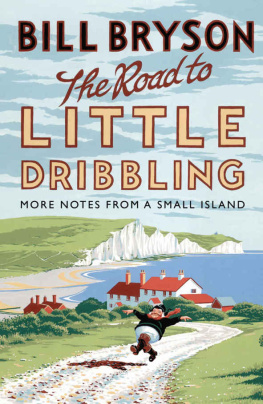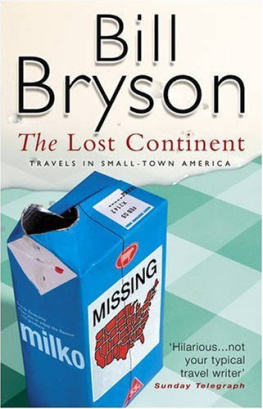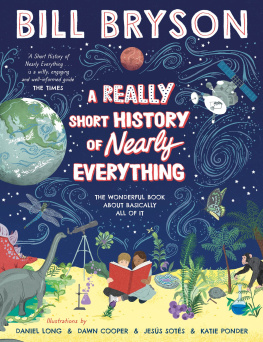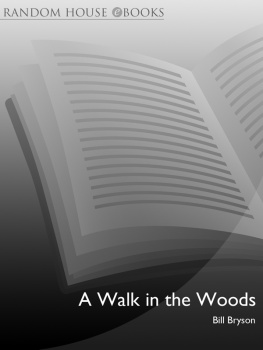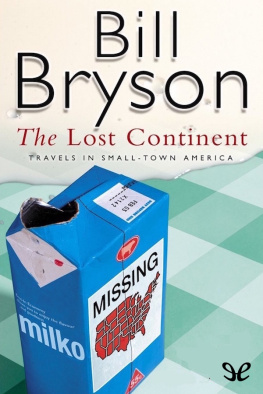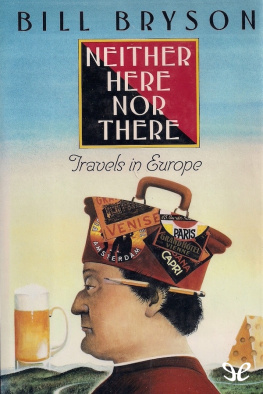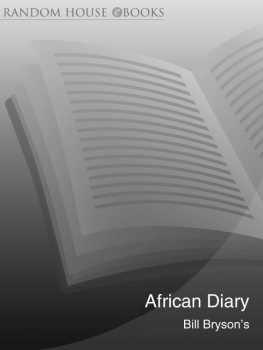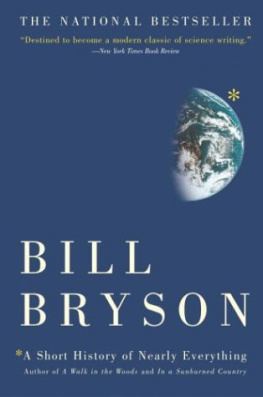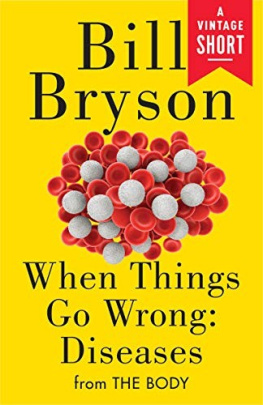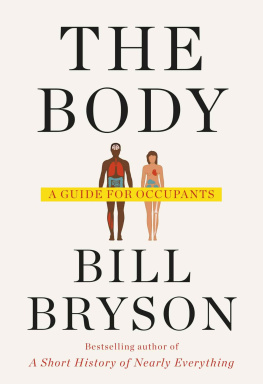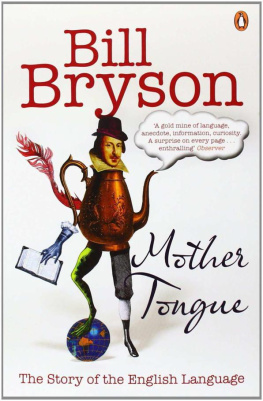Bill Bryson - A Short History of Nearly Everything
Here you can read online Bill Bryson - A Short History of Nearly Everything full text of the book (entire story) in english for free. Download pdf and epub, get meaning, cover and reviews about this ebook. year: 2003, publisher: Broadway Books, genre: Detective and thriller. Description of the work, (preface) as well as reviews are available. Best literature library LitArk.com created for fans of good reading and offers a wide selection of genres:
Romance novel
Science fiction
Adventure
Detective
Science
History
Home and family
Prose
Art
Politics
Computer
Non-fiction
Religion
Business
Children
Humor
Choose a favorite category and find really read worthwhile books. Enjoy immersion in the world of imagination, feel the emotions of the characters or learn something new for yourself, make an fascinating discovery.

- Book:A Short History of Nearly Everything
- Author:
- Publisher:Broadway Books
- Genre:
- Year:2003
- Rating:5 / 5
- Favourites:Add to favourites
- Your mark:
- 100
- 1
- 2
- 3
- 4
- 5
A Short History of Nearly Everything: summary, description and annotation
We offer to read an annotation, description, summary or preface (depends on what the author of the book "A Short History of Nearly Everything" wrote himself). If you haven't found the necessary information about the book — write in the comments, we will try to find it.
A Short History of Nearly Everything — read online for free the complete book (whole text) full work
Below is the text of the book, divided by pages. System saving the place of the last page read, allows you to conveniently read the book "A Short History of Nearly Everything" online for free, without having to search again every time where you left off. Put a bookmark, and you can go to the page where you finished reading at any time.
Font size:
Interval:
Bookmark:
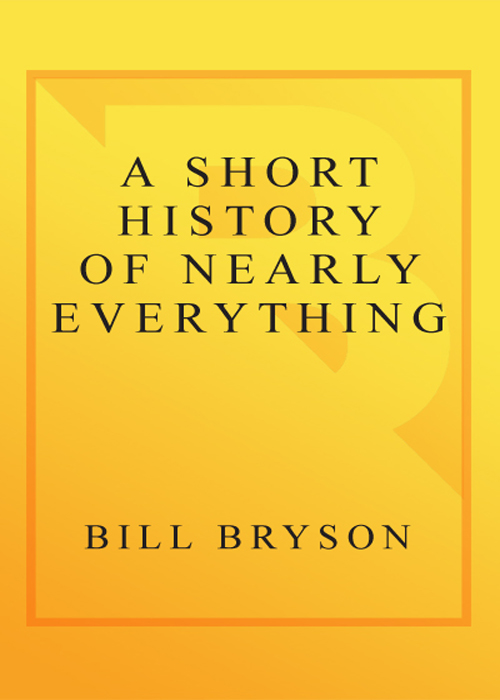
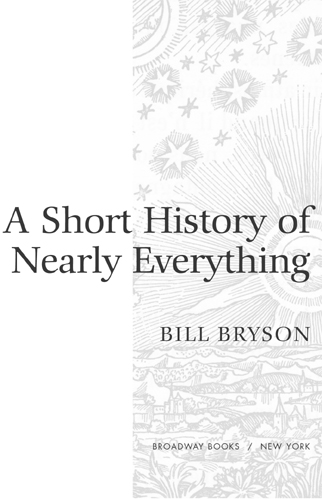
CONTENTS
To Meghan and Chris. Welcome.
The physicist Leo Szilard once announced to his friend Hans Bethe that he was thinking of keeping a diary: I don't intend to publish. I am merely going to record the facts for the information of God. Don't you think God knows the facts? Bethe asked. Yes, said Szilard. He knows the facts, but He does not know this version of the facts.
Hans Christian von Baeyer, Taming the Atom
ACKNOWLEDGMENTS
As I sit here, in early 2003, I have before me several pages of manuscript bearing majestically encouraging and tactful notes from Ian Tattersall of the American Museum of Natural History pointing out, inter alia, that Prigueux is not a wine-producing region, that it is inventive but a touch unorthodox of me to italicize taxonomic divisions above the level of genus and species, that I have persistently misspelled Olorgesaille (a place that I only recently visited), and so on in similar vein through two chapters of text covering his area of expertise, early humans.
Goodness knows how many other inky embarrassments may lurk in these pages yet, but it is thanks to Dr. Tattersall and all of those whom I am about to mention that there aren't many hundreds more. I cannot begin to thank adequately those who helped me in the preparation of this book. I am especially indebted to the following, who were uniformly generous and kindly and showed the most heroic reserves of patience in answering one simple, endlessly repeated question: I'm sorry, but can you explain that again?
In the United States: Ian Tattersall of the American Museum of Natural History in New York; John Thorstensen, Mary K. Hudson, and David Blanchflower of Dartmouth College in Hanover, New Hampshire; Dr. William Abdu and Dr. Bryan Marsh of Dartmouth-Hitchcock Medical Center in Lebanon, New Hampshire; Ray Anderson and Brian Witzke of the Iowa Department of Natural Resources, Iowa City; Mike Voorhies of the University of Nebraska and Ashfall Fossil Beds State Park near Orchard, Nebraska; Chuck Offenburger of Buena Vista University, Storm Lake, Iowa; Ken Rancourt, director of research, Mount Washington Observatory, Gorham, New Hampshire; Paul Doss, geologist of Yellowstone National Park, and his wife, Heidi, also of the National Park; Frank Asaro of the University of California at Berkeley; Oliver Payne and Lynn Addison of the National Geographic Society; James O. Farlow, Indiana-Purdue University; Roger L. Larson, professor of marine geophysics, University of Rhode Island; Jeff Guinn of the Fort Worth Star-Telegram newspaper; Jerry Kasten of Dallas, Texas; and the staff of the Iowa Historical Society in Des Moines.
In England: David Caplin of Imperial College, London; Richard Fortey, Len Ellis, and Kathy Way of the Natural History Museum; Martin Raff of University College, London; Rosalind Harding of the Institute of Biological Anthropology in Oxford; Dr. Laurence Smaje, formerly of the Wellcome Institute; and Keith Blackmore of The Times.
In Australia: the Reverend Robert Evans of Hazelbrook, New South Wales; Alan Thorne and Victoria Bennett of the Australian National University in Canberra; Louise Burke and John Hawley of Canberra; Anne Milne of the Sydney Morning Herald; Ian Nowak, formerly of the Geological Society of Western Australia; Thomas H. Rich of Museum Victoria; Tim Flannery, director of the South Australian Museum in Adelaide; and the very helpful staff of the State Library of New South Wales in Sydney.
And elsewhere: Sue Superville, information center manager at the Museum of New Zealand in Wellington, and Dr. Emma Mbua, Dr. Koen Maes, and Jillani Ngalla of the Kenya National Museum in Nairobi.
I am also deeply and variously indebted to Patrick Janson-Smith, Gerald Howard, Marianne Velmans, Alison Tulett, Larry Finlay, Steve Rubin, Jed Mattes, Carol Heaton, Charles Elliott, David Bryson, Felicity Bryson, Dan McLean, Nick Southern, Patrick Gallagher, Larry Ashmead, and the staff of the peerless and ever-cheery Howe Library in Hanover, New Hampshire.
Above all, and as always, my profoundest thanks to my dear, patient, incomparable wife, Cynthia.
INTRODUCTION
Welcome. And congratulations. I am delighted that you could make it. Getting here wasn't easy, I know. In fact, I suspect it was a little tougher than you realize.
To begin with, for you to be here now trillions of drifting atoms had somehow to assemble in an intricate and intriguingly obliging manner to create you. It's an arrangement so specialized and particular that it has never been tried before and will only exist this once. For the next many years (we hope) these tiny particles will uncomplainingly engage in all the billions of deft, cooperative efforts necessary to keep you intact and let you experience the supremely agreeable but generally underappreciated state known as existence.
Why atoms take this trouble is a bit of a puzzle. Being you is not a gratifying experience at the atomic level. For all their devoted attention, your atoms don't actually care about youindeed, don't even know that you are there. They don't even know that they are there. They are mindless particles, after all, and not even themselves alive. (It is a slightly arresting notion that if you were to pick yourself apart with tweezers, one atom at a time, you would produce a mound of fine atomic dust, none of which had ever been alive but all of which had once been you.) Yet somehow for the period of your existence they will answer to a single overarching impulse: to keep you you.
The bad news is that atoms are fickle and their time of devotion is fleetingfleeting indeed. Even a long human life adds up to only about 650,000 hours. And when that modest milestone flashes past, or at some other point thereabouts, for reasons unknown your atoms will shut you down, silently disassemble, and go off to be other things. And that's it for you.
Still, you may rejoice that it happens at all. Generally speaking in the universe it doesn't, so far as we can tell. This is decidedly odd because the atoms that so liberally and congenially flock together to form living things on Earth are exactly the same atoms that decline to do it elsewhere. Whatever else it may be, at the level of chemistry life is curiously mundane: carbon, hydrogen, oxygen, and nitrogen, a little calcium, a dash of sulfur, a light dusting of other very ordinary elementsnothing you wouldn't find in any ordinary drugstoreand that's all you need. The only thing special about the atoms that make you is that they make you. That is of course the miracle of life.
Whether or not atoms make life in other corners of the universe, they make plenty else; indeed, they make everything else. Without them there would be no water or air or rocks, no stars and planets, no distant gassy clouds or swirling nebulae or any of the other things that make the universe so usefully material. Atoms are so numerous and necessary that we easily overlook that they needn't actually exist at all. There is no law that requires the universe to fill itself with small particles of matter or to produce light and gravity and the other physical properties on which our existence hinges. There needn't actually be a universe at all. For the longest time there wasn't. There were no atoms and no universe for them to float about in. There was nothingnothing at all anywhere.
So thank goodness for atoms. But the fact that you have atoms and that they assemble in such a willing manner is only part of what got you here. To be here now, alive in the twenty-first century and smart enough to know it, you also had to be the beneficiary of an extraordinary string of biological good fortune. Survival on Earth is a surprisingly tricky business. Of the billions and billions of species of living thing that have existed since the dawn of time, most99.99 percentare no longer around. Life on Earth, you see, is not only brief but dismayingly tenuous. It is a curious feature of our existence that we come from a planet that is very good at promoting life but even better at extinguishing it.
Next pageFont size:
Interval:
Bookmark:
Similar books «A Short History of Nearly Everything»
Look at similar books to A Short History of Nearly Everything. We have selected literature similar in name and meaning in the hope of providing readers with more options to find new, interesting, not yet read works.
Discussion, reviews of the book A Short History of Nearly Everything and just readers' own opinions. Leave your comments, write what you think about the work, its meaning or the main characters. Specify what exactly you liked and what you didn't like, and why you think so.




